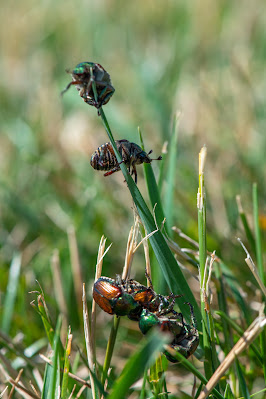Cassie Cichorz
WSDA Pest Program
Japanese beetle is a non-native pest that feeds on over 300 plants by skeletonizing leaves. Their larvae feed on plant roots below the surface. Japanese beetles can lay many eggs in a cycle, making them difficult to control or eradicate. Japanese beetle would pose a serious threat to farms, gardens, and the environment if they became established in Washington State.
In Grandview, a resident reported picking as many as 75 beetles from her roses in a single day in 2020. WSDA trapped over 24,000 beetles in the same area in 2021. WSDA is conducting an eradication of this pest and is asking residents to respond by reporting, trapping, and providing treatment consent.
What can you do?
If you are in Washington, you can monitor for this pest by being on the lookout. If you see Japanese beetle, please report it!
Adults – seen in summer
- 1/3 – ½ inch long
- Metallic green head and thorax
- Copper wing covers
Larvae (grubs) – seen in spring
- 1/8 – 1 inch long
- Brown/tan head with legs
- Found in soil, especially in lawns
Take a picture of the pest, and note the location. Then visit our online reporting form to upload. You can also report by email at PestProgram@agr.wa.gov, or call 1-800-443-6684.
If you reside in Grandview, you only need to report when trapping for beetles.
Yakima and Benton County residents
In addition to monitoring and reporting for Japanese beetle, you can trap beetles yourself!
Trapping will catch adult beetles, which can lower their current population, and is another way to control this pest. A wide variety of traps are available for purchase, or you can make one yourself.
 |
| Japanese beetle drop-off container in Grandview |
WSDA suggests placing traps from mid-May through mid-October when the adult beetles are active. When placing a trap, remember to keep it on your property. Make sure to check your trap periodically and replace as needed.
If you capture any beetles, please report them. You can report by leaving the catch at the drop-off location, or sending in a report.
If you live near Grandview, a drop-off cooler has been placed inside Blehyl Co-op at 940 E Wine Country Road. The cooler is located inside the entrance of the store on the left. Please write the trap’s address on your collection.
If you are not near the drop-off location, take a picture of your trap capture and note the trap’s location. Then upload that information to our online reporting form, email PestProgram@agr.wa.gov, or call 1-800-443-6684.
Treatment area residents
If you live in or around the Grandview area, you may be inside the 49-square-mile treatment zone. You can help prevent the spread of Japanese beetles by not moving items on which they can travel and spread.
Japanese beetle eggs and larvae live in the soil below the surface, so don’t move soil or fill, and leave soil on site. Also if you have any potted or outdoor plants, do not move them.
Adult beetles can travel on waste or debris from yards, gardens, and other horticulture activities. If you landscape or garden, leave your lawn clippings, leaves, weeds, and garden debris in the treatment area.
Free treatment
Free treatments for Japanese beetle are continuing in the Grandview area. This helps prevent the establishment of this invasive pest. You can give consent to have your property treated by going to agr.wa.gov/beetles. You will need to provide your unique property ID number. If you need help obtaining this, contact us at PestProgram@agr.wa.gov or 1-800-443.6684.
WSDA has hired a contractor to apply the treatment, and our staff will be in the field monitoring the treatment progress. Treatments are relatively fast and you do not need to be home for the process.
Stay connected
WSDA is dedicated to working with the public to provide information on Japanese beetle. WSDA has taken pictures of the pest around the Grandview area, to view images please visit flickr.com/wsdagov.
View the Pest Alert for Japanese beetle.
- Join the Japanese beetle Facebook group.
- Join the Pest Program email listserv.


